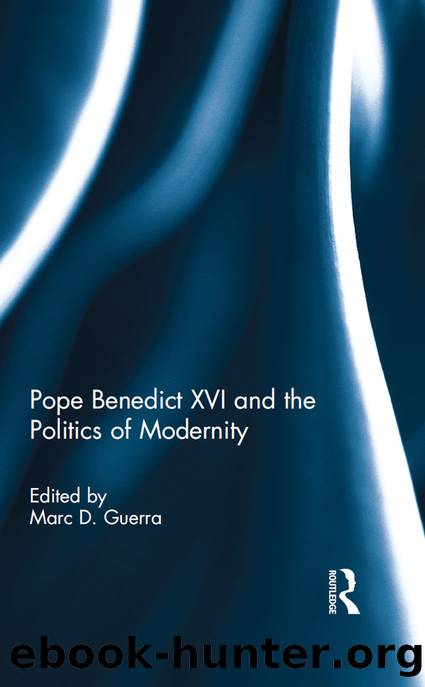Pope Benedict XVI and the Politics of Modernity by Marc D. Guerra

Author:Marc D. Guerra [Guerra, Marc D.]
Language: eng
Format: epub
Tags: Political Science, General
ISBN: 9780415637145
Google: aXpFLgEACAAJ
Barnesnoble:
Goodreads: 17842080
Publisher: Routledge
Published: 2013-01-15T00:29:52+00:00
III. A theological anthropology
There are three main points for consideration of Benedictâs anthropology: (1) the Biblical foundation of his understanding of the human person, (2) the primacy of conscience, and (3) the necessity of relationship and communion among persons. Following Thomas Rourkeâs analysis of Benedictâs anthropology, I would like to begin this section of my study with a reflection on a very profound (and somewhat technical) article from 1990 published by then Cardinal Joseph Ratzinger, âConcerning the Notion of the Person in Theology.â16 Benedict begins this essay with a somewhat shocking thesis that only Christian theology can give an adequate account of the person; Greek philosophy could not have conceived the depths of the meaning of the human person. The concept of the person arose because of manâs reflection on the question of Godâs nature and Christâs nature, and thus for Benedict, it is an essentially and uniquely Christian concept. As Rourke points out in his commentary, âAristotle classified it [that is, person] as on of the âaccidentsâ of being, purely contingent, existing only under circumstances as a changing component of a substance.â17 Philosophy unaided by faith was unable to render the fullest account of human nature according to Benedict. His account of the human person is decidedly technical and theological, so I will attempt to summarize the essential insights that shape what I believe is a theological and not merely a philosophical anthropology. This elucidation is essential for understanding Benedictâs approach to politics.
Benedict follows Augustine in his argument that the Trinitarian nature of God as revealed in the Christian Scriptures is essential to understand human nature: âGod is a being in three persons. In this context, theologians argue, person must be understood as relationâ¦. Relation, being related, is not something superadded to the person, but it is the person itself. In its nature, the person exists only as relation.â18 This existence as relation refers to the three persons of the Trinity according to Christian revelation: God the Father, God the Son, and God the Holy Spirit. But the question arises: Does this understanding of the Divine persons in Christianity as âpure relatednessâ apply to human beings?19 Benedict argues in the affirmative and it is in his reflections on Christology that he affirms his understanding of the human person as âpure relatedness.â According to Benedict XVI, the concept of personhood had to be worked out in the early centuries of Christianity to understand who Christ is as one person with two natures, human and divine. The Church rejected various heresies that denied the humanity or divinity of Christ, and in the working out of these heresies, Christianity was forced to reflect on the meaning of person. For Benedict, the person of Christ stands as âthe true fulfillment of the idea of the human person.â20 Christâs words in Matthew 10:36, âOnly the one who loses himself can find himselfâ captures the essence of the human spirit, âthe nature of the spiritâ¦comes to itself and actualizes its own fullness only by going away from itself, by going to what is other than itself.
Download
This site does not store any files on its server. We only index and link to content provided by other sites. Please contact the content providers to delete copyright contents if any and email us, we'll remove relevant links or contents immediately.
| Africa | Americas |
| Arctic & Antarctica | Asia |
| Australia & Oceania | Europe |
| Middle East | Russia |
| United States | World |
| Ancient Civilizations | Military |
| Historical Study & Educational Resources |
Cecilia; Or, Memoirs of an Heiress — Volume 1 by Fanny Burney(32546)
Cecilia; Or, Memoirs of an Heiress — Volume 2 by Fanny Burney(31943)
Cecilia; Or, Memoirs of an Heiress — Volume 3 by Fanny Burney(31929)
The Secret History by Donna Tartt(19052)
Sapiens: A Brief History of Humankind by Yuval Noah Harari(14368)
Leonardo da Vinci by Walter Isaacson(13316)
The Radium Girls by Kate Moore(12018)
Sapiens by Yuval Noah Harari(5365)
How Democracies Die by Steven Levitsky & Daniel Ziblatt(5215)
The Wind in My Hair by Masih Alinejad(5091)
Homo Deus: A Brief History of Tomorrow by Yuval Noah Harari(4907)
Endurance: Shackleton's Incredible Voyage by Alfred Lansing(4769)
Man's Search for Meaning by Viktor Frankl(4581)
The Silk Roads by Peter Frankopan(4525)
Millionaire: The Philanderer, Gambler, and Duelist Who Invented Modern Finance by Janet Gleeson(4465)
The Rape of Nanking by Iris Chang(4203)
Joan of Arc by Mary Gordon(4100)
The Motorcycle Diaries by Ernesto Che Guevara(4089)
Stalin by Stephen Kotkin(3957)
